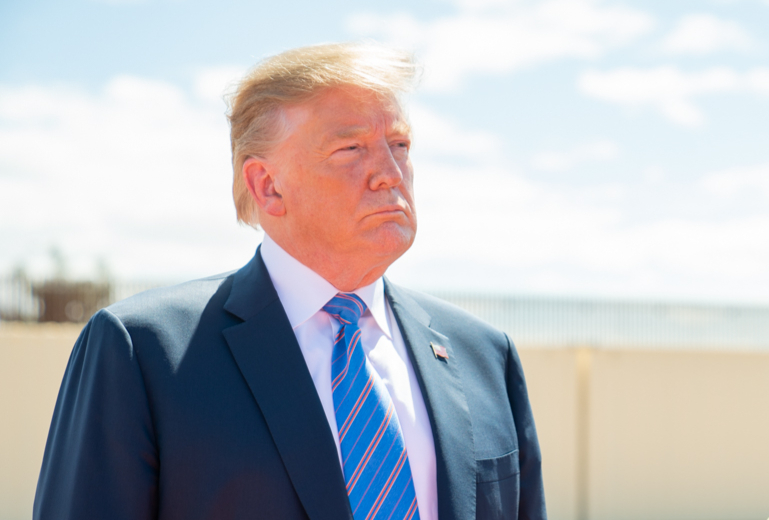Civilization
American Flag Officers Don’t Get It: Sliding Civil-Military Relations Norms

On February 29th, Donald Trump toured the Texas border as part of a campaign event hosted by Governor Greg Abbot. During the event, the Texas Adjutant General – a politically appointed two-star Texas Air National Guard general – stood in uniform and in full view of television cameras for the duration of Trump’s politically charged, partisan campaign speech. This prompted a probe of Major General Thomas Suelzer, member of the Texas State Guard (TXSG), as a potential violation of DOD Instruction 1344.10 for appearing in uniform at a partisan political event, giving the appearance of military endorsement of a political candidate for office. While the National Guard reviews the incident, the Texas Military Department has a policy that clearly states “Members of the TXSG may not attend partisan political events in uniform or as an official representative of the TXSG.”
The blurring lines of military members – be it on active-duty, reserve or guard status – engaging in political activities and partisan behavior, is becoming increasingly problematic and normalized. As our recent Armed Forces & Society article about civil-military relations identified, the behavior and remarks made by current and former generals and admirals is normalizing military involvement in publicly contentious debates. The open resignation of a U.S. Army Major in protest of U.S. support of Israel in the Gaza Conflict on LinkedIn or the U.S. Marine Lieutenant Colonel criticizing political and military leaders for the Afghanistan collapse in a viral video, are increasingly suggestive of a military that is being de-professionalized in the era of social media. We contend that unprofessional conduct by some political leaders is leading to some retired military officers criticizing political leadership, leading to the normalization of partisan military behavior.
Retired Military Officers are still subject to Uniformed Code of Military Justice
In a March 1stFinancial Times interview, former Chairman of the Joint Chiefs General Mark Milley said,
I’ve fought for my freedom of speech. I’ve fought for the constitution… There’s nothing technically illegal about speaking out … But I think it’s highly inappropriate for generals, retired or active, to opine on politics.
Actually, generals speaking out and opining on politics can be illegal, if such comments are contemptuous, per the Uniform Code of Military Justice (UCMJ) – there’s no technicalities about it. Milley’s statement captures an emerging problem plaguing the military since the Trump presidency: Retired generals and admirals – still very much associated with and representing the military voice in the eyes of the public – either don’t understand the legal boundaries governing their speech, or they know the laws and don’t care.
In 2019, the U.S. Supreme Court ruled that military retirees can be court-martialed for crimes even in retirement. Few realize that UCMJ laws still apply to retired military officers, meaning that a retired officer could be theoretically charged for UCMJ Article 88: Contemptuous words toward officials. That’s why Dwight Eisenhower resigned his commission in July of 1952 after announcing his candidacy for the presidency.
Normalization of critical political speech
Whether ignorance or indifference, the growing normalization of critical political speech by retired senior military officers is contributing to a disconcerting leakage of apolitical professionalism within the ranks. For instance, a U.S. Airman immolated himself in uniform in front of the Israeli embassy to protest the Gaza Conflict. Declining military norms around political forbearance is eroding the longstanding tradition of nonpartisanship. As the military becomes more politicized, it risks becoming another pawn in American politics. In fact, American confidence in the U.S. military is now at 60 percent, the lowest it’s been since 1997.
Senior military officers seemingly don’t understand legally allowed speech against a sitting president or other elected officials. Milley’s comment indicates his lack of understanding of the rules and is a microcosm of a systemic problem among retired flag officers engaging in political discourse. Left unchecked, the U.S. is on a dangerous trajectory of eroding civil-military norms. This downward spiral of military professionalism correlates with increased politicization and risks a sort of gray zone civil-military exploitation by politicians inclined to leverage military support for political gains, especially during contentious election cycles.
Breaking of historical norms
Aligning political messaging with perceived military support – or public decry by retired generals – influences public opinion. For the preponderance of his presidency, retired senior officers regularly and critically made public comments about Trump for unprofessional presidential behavior, especially when he suggested using military forces domestically. Despite UCMJ laws prohibiting contemptuous and treasonous language, there has been no recourse or public backlash for the recent chorus of general and flag officers expressing their discontent for former President Trump.
Prior to Trump, restraint defined normative approaches to use of military force domestically. Similarly, restraint defined retired flag officer speech – presumably because presidents generally restrained from bringing the military into domestic conversations. With Trump’s regular threats to deploy troops to the border or to use military force domestically against protesters, retired military officers regularly criticized an elected official, in contrast to perceived norms and in departure from actual laws. With historical norms shattered, American trust in the military as a neutral, nonpartisan actor is at risk. Correspondingly, creeping politicization erodes good order and discipline within the ranks.
Politicians abusing the perception of Military support?
In his 2012 presidential run, Mitt Romney spoke to an audience on the campus of the Citadel, and gave a partisan speech condemning then President Obama with cadets in uniform sitting in the background of the televised event. He also later gave a campaign speech at the Virginia Military Institute, again with uniformed cadets in the audience. Other presidential candidates, such as John McCain, also spoke at the Virginia Military Institute and the Citadel as part of their political campaigns.
Do such events give the perception of military endorsement of a political candidate to the general public? Most likely. It’s not uncommon for politicians to seek out people in uniform as the backdrop for impassioned political speeches. While these cadets at public universities are not on active duty, their involvement makes politicians more likely to abuse civil-military relations to their benefit, much as Trump did with General Suelzer.
Restoring the Barriers between the Military and Politics
The American military needs a refresher; a reminder to return to the norm of nonpartisanship among the ranks – and the message starts at the top. The U.S. military risks continued gray zone exploitation for political gain. Similarly, sliding civil-military norms means this type of politicized behavior is normalized across the U.S. Armed Forces, where more service members feel the need to openly and publicly ‘voice’ their concerns about a crisis or politician.
American society should not want former military officers wading into politics and influencing public opinion. Thus, existing laws must be enforced, otherwise UCMJ Article 88 risks becoming another dead letter law in modern society. If rule of law and its credibility matter, retired military officers should legally resign their commissions before entering partisan conversations through elected office, as political appointees, and/or as opinionated media commentators.
Allowing political exploitation of the military spells disaster for its professionalism. Without a purposeful intervention, Trump will likely seek out campaign events in red states with National Guard troops as the backdrop to generate the appearance of military support for his campaign. The military, including Guard and Reserve forces, must not allow further political exploitation.
Editor’s Notes
This article appeared originally with this disclaimer:
The views expressed are those of the authors and do not reflect the official position of the United States Air Force Academy, United States Naval War College, Department of the Air Force, Department of the Navy, Department of Defense, or of any organization the authors are affiliated with.
CNAV would add that the views expressed do not necessarily represent those of CNAV, either. Your editor begs leave to recall one salient omission from the litany of bad examples. This was the speech by President Biden on 2 September 2022, with uniformed U.S. Marines as part of the backdrop. That example occurred well in advance of Donald Trump’s Texas border tour.
This article was originally published by RealClearDefense and made available via RealClearWire.
-

 Accountability2 days ago
Accountability2 days agoWaste of the Day: Principal Bought Lobster with School Funds
-

 Constitution2 days ago
Constitution2 days agoTrump, Canada, and the Constitutional Problem Beneath the Bridge
-

 Executive18 hours ago
Executive18 hours agoHow Relaxed COVID-Era Rules Fueled Minnesota’s Biggest Scam
-

 Civilization18 hours ago
Civilization18 hours agoThe End of Purple States and Competitive Districts
-

 Civilization4 days ago
Civilization4 days agoThe devil is in the details
-

 Executive4 days ago
Executive4 days agoTwo New Books Bash Covid Failures
-

 Civilization3 days ago
Civilization3 days agoThe Conundrum of President Donald J. Trump
-

 Executive4 days ago
Executive4 days agoThe Israeli Lesson Democrats Ignore at Their Peril






